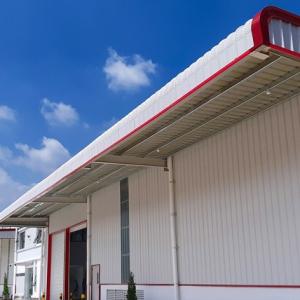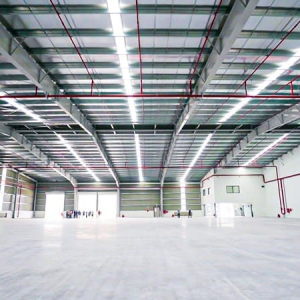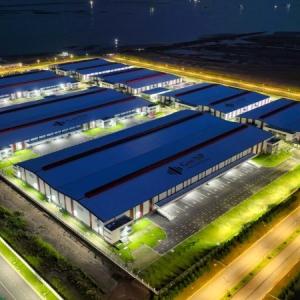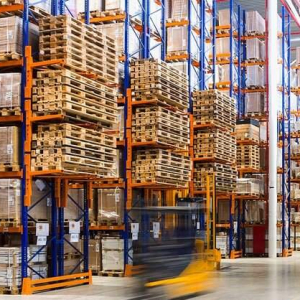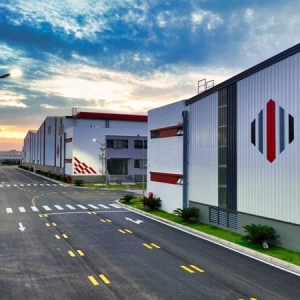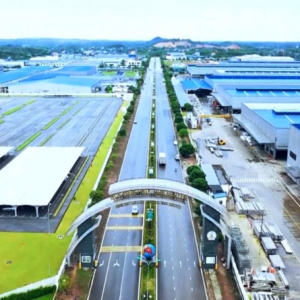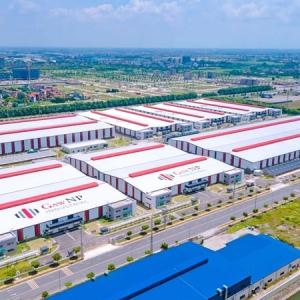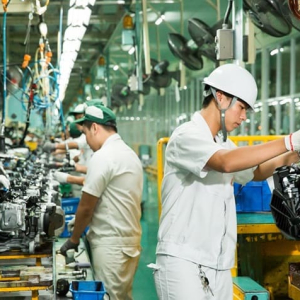Top 4 Most Popular Types of Industrial Factories Nowadays
August 30, 2024 02:10 AM
Industrial factories play a crucial role in production and economic development. With the advancement of science and technology, the types of factories have become increasingly diverse to meet the multi-industry production needs. In this article, we will explore the top 4 common and widely applied types of industrial factories today. 1. What is an Industrial […]
Industrial factories play a crucial role in production and economic development. With the advancement of science and technology, the types of factories have become increasingly diverse to meet the multi-industry production needs. In this article, we will explore the top 4 common and widely applied types of industrial factories today.
1. What is an Industrial factory?
An industrial factory is a large-scale construction used for manufacturing, storage, transportation, or distribution activities in industrial and manufacturing sectors. Industrial factories typically have steel or reinforced concrete structures, with roofs and surrounding walls. They can be designed in various forms depending on the intended use, production specifics, and business requirements.
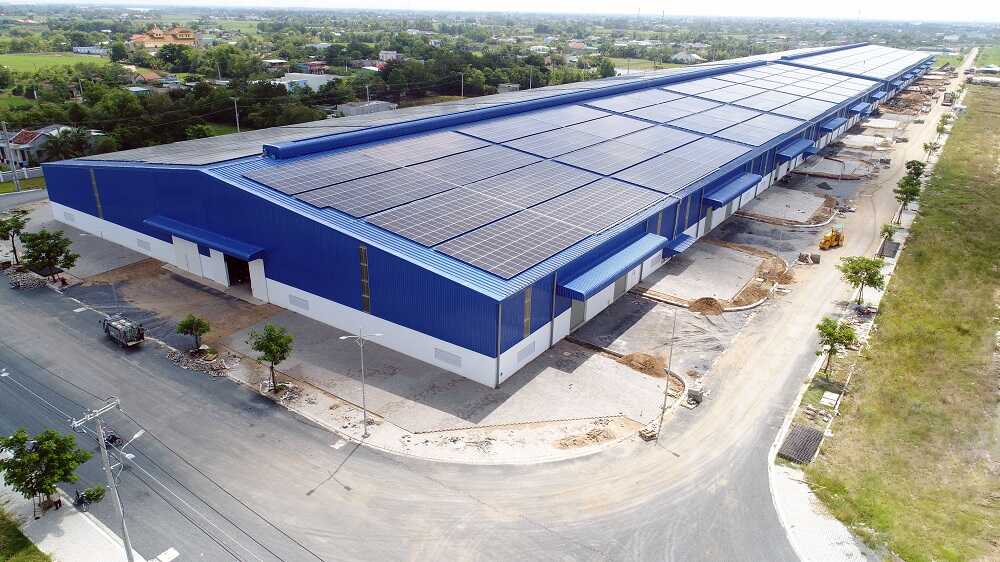
The industrial factory is a construction with a large and spacious area
Industrial factories can be classified based on various criteria, including:
- Construction Material: Concrete-reinforced steel factories, steel-framed factories.
- Number of Floors: Single-floor factories, multi-story factories.
- Demand: Pre-built factories, custom-built factories.
Industrial factories play a vital role in the economy by producing goods, providing services, creating employment opportunities, and contributing to the socio-economic development of the country.
2. Four Common Classifications of Industrial factories
2.1. Based on Construction Material
Concrete-Reinforced Steel Factory
Concrete-reinforced steel factories are a common type of factories constructed entirely with concrete structural components. This includes the foundation, columns, beams, and floors, all cast with reinforced concrete. This material ensures high durability and load-bearing capacity for both the structure and heavy equipment within the factory.
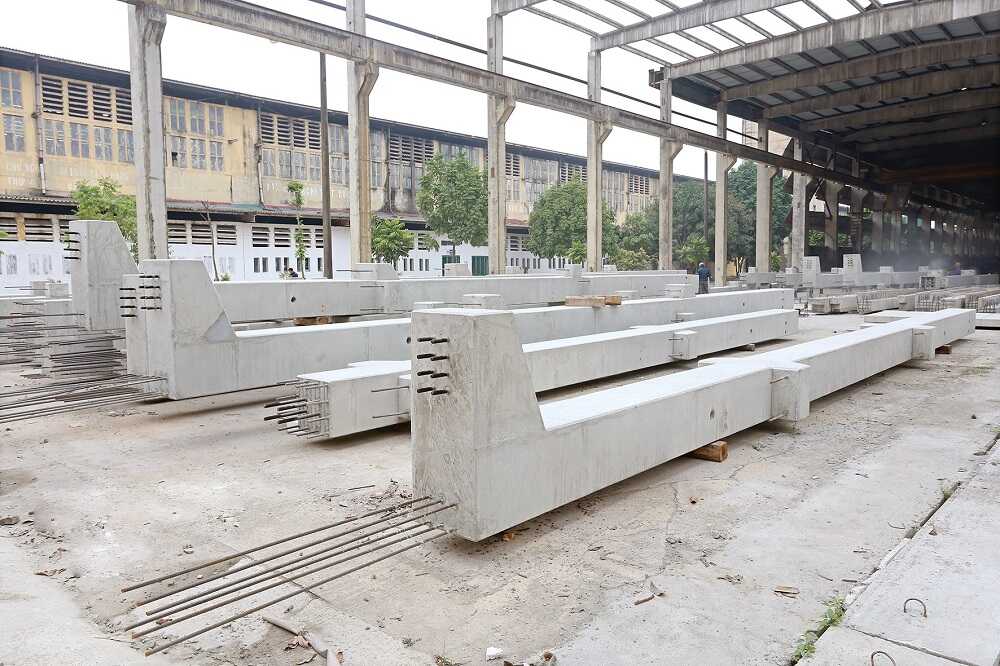
The type of factory is constructed entirely with concrete
Specifically, the walls of concrete-reinforced steel factories are constructed with thick bricks, usually ranging from 10-20 cm, depending on the design requirements. The brick walls serve to partition different areas within the factory.
For roofing, these factories typically use galvanized color-coated steel with insulation layers to minimize heat and noise during rain and wind. The roof is installed with a robust truss system to support the metal sheets.
This type of factory is often used in large-scale manufacturing industries that demand high durability and load-bearing capacity for both the structure and heavy equipment within the factory. Examples include steel production, cement manufacturing, ceramic tile production, and construction materials.
Prefabricated Steel Structure Factory
A steel structure factory is a type of construction that utilizes steel trusses as the primary load-bearing structure. Specifically, the columns and beams are made of high-strength steel trusses. The foundation, however, is still cast with reinforced concrete to ensure stability for the entire structure.
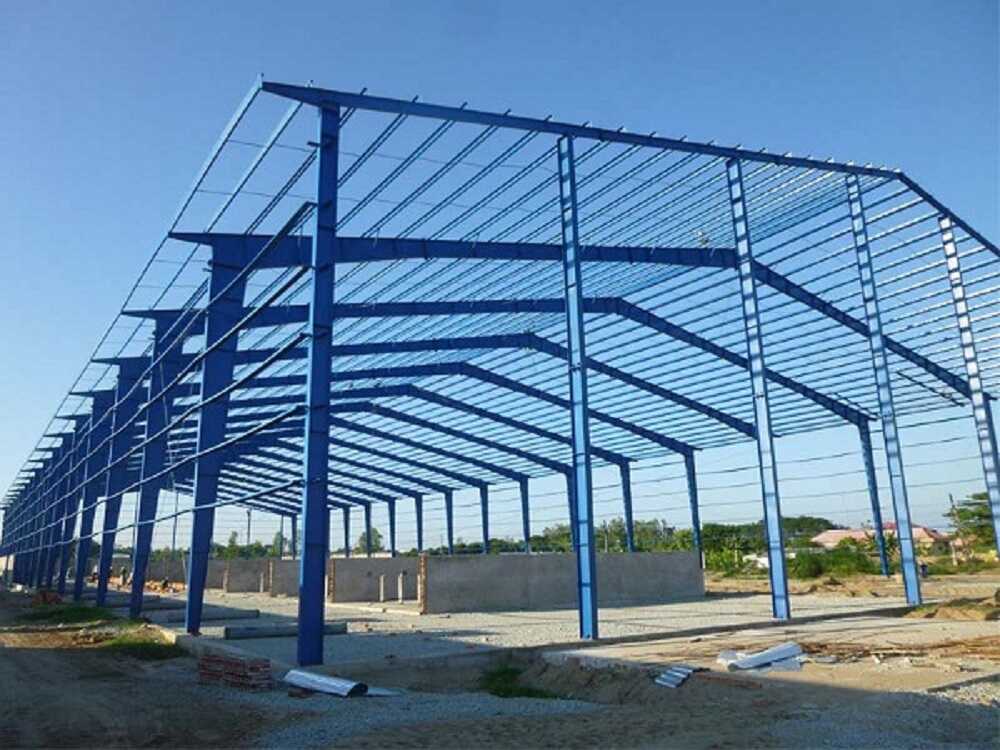
A steel-structured factory uses steel trusses as the main load-bearing structure
After completing the foundation, concrete anchor bolts are installed to secure the steel columns. The steel columns and beams are then erected to form the load-bearing frame for the factory.
The walls of a steel structure factory are typically constructed with thick bricks, ranging from 10-20 cm in thickness and 2.2-2.8m in height. The upper part is covered with galvanized metal sheets, and partitions are installed between different areas.
For the roofing, steel structure factories also use galvanized metal sheets with insulation, similar to concrete-reinforced steel factories. The truss system and roof support are designed to be robust.
This type of factory is commonly used in medium and small-scale manufacturing industries, where lighter machinery and equipment are installed. Examples include the wood, furniture, leather, and textile industries.
2.2. Factories Based on Function
Factories without Offices: This type of factory is primarily used for production processes, without space designated for administrative work. It is specially designed to support various types of production, from consumer goods manufacturing to metal processing and various other fields.
Factories with Combined Offices: This integrated model is divided into two main areas: office space and production factory space. This model offers several advantages for businesses, including cost savings in investment, operational flexibility, and suitability for both small and medium-sized enterprises, especially those with smaller scales and fewer personnel.
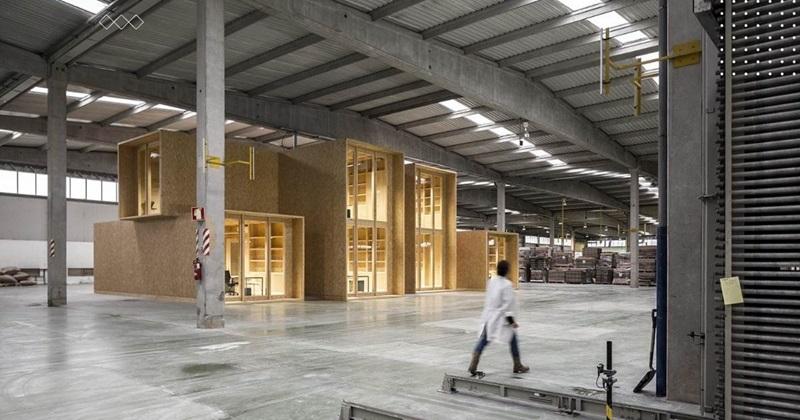
A factory combined with flexible office space during operation
Integrating offices into the production factory not only optimizes management but also creates a positive and efficient working environment, enhancing interaction between the management and production departments of the business.
2.3. Factory Based on Height
Single-Story factory: This is a widely adopted factory model due to its flexibility, making it easy to expand production and convenient for design adjustments to suit specific industries such as cold storage, food, and machinery.
Multi-Story factory (2 or more stories): This is a solution for businesses facing limited land space. Suitable for small-scale enterprises in support industries, this factory has a structure comprising a foundation, steel frame, and covered structure. The advantages of this multi-story factory model include cost savings and reduced construction space. Applied in industries that do not adversely impact the environment, multi-story factories serve businesses with light machinery and flexible space requirements.
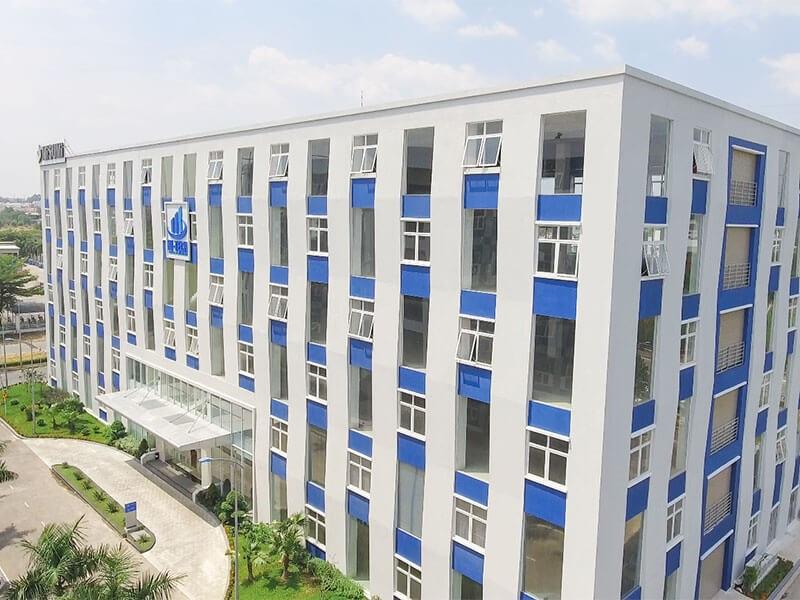
Multi-story factories are a solution for businesses with limited land space
2.4. Customized Construction factories
Ready-built rental factories: This is a popular choice in recent years, especially favored by small and medium-scale investors. It is a cost-effective and time-saving solution, ensuring efficient operational capabilities.
Custom-Built factories: This is a flexible choice, particularly suitable for businesses in specialized industries such as food, cold storage, and foreign trade factories. Building factories according to specific requirements maximizes functionality, stabilizes production quickly, and minimizes initial investment costs.
3. Reasons Industrial factories Are the Choice for Many Businesses
3.1. Industrial factories Have Many Superior Characteristics
Industrial factories are designed to high technical standards, ensuring safety, load-bearing capacity, fire resistance, noise reduction, waterproofing, and heat resistance. The factories are equipped with modern systems for electricity, water, ventilation, air conditioning, fire alarms, firefighting, and security. They offer flexibility in space utilization, allowing expansion or contraction according to business needs. Moreover, they are suitable for various industries, from light to heavy, from manual to high-tech.
3.2. Industrial factories Help Save Costs
Compared to renting or buying other types of real estate such as houses, villas, apartments, or offices, industrial factories are much more cost-effective. This helps businesses save on initial investment and monthly maintenance costs. Additionally, industrial factories can take advantage of tax incentives and state support policies for manufacturing and business operations in industrial zones.
3.3. Rapid Construction of Industrial factories
Thanks to the use of modern materials and equipment, the construction process of industrial factories is fast and efficient. The construction time for industrial factories is typically between 3 to 6 months, while other types of real estate may take 1 to 2 years to complete. This helps businesses save time and money and increases competitiveness in the market.
4. Brand for Premium Pre-engineered Steel Industrial factory Rental in Vietnam
In recent years, Vietnam has become an attractive destination for foreign investors, particularly in manufacturing and e-commerce. The demand for industrial factories to support production and business activities is steadily increasing. Responding to this demand, Gaw NP Industrial has emerged as a brand for premium pre-engineered steel industrial factory rentals in Vietnam.
Gaw NP Industrial is a joint venture between Gaw Capital Partners, a leading real estate investment fund in Asia, and NP Capital, one of the most experienced real estate investors and developers in Vietnam. With a combination of international expertise and local understanding, Gaw NP Industrial provides comprehensive industrial factory solutions to businesses.
Gaw NP Industrial owns three prominent industrial centers in Vietnam: GNP Dong Van 3, GNP Nam Dinh Vu, and GNP Yen Binh 1 & 2. These centers offer strategic locations and top-quality facilities in Vietnam.
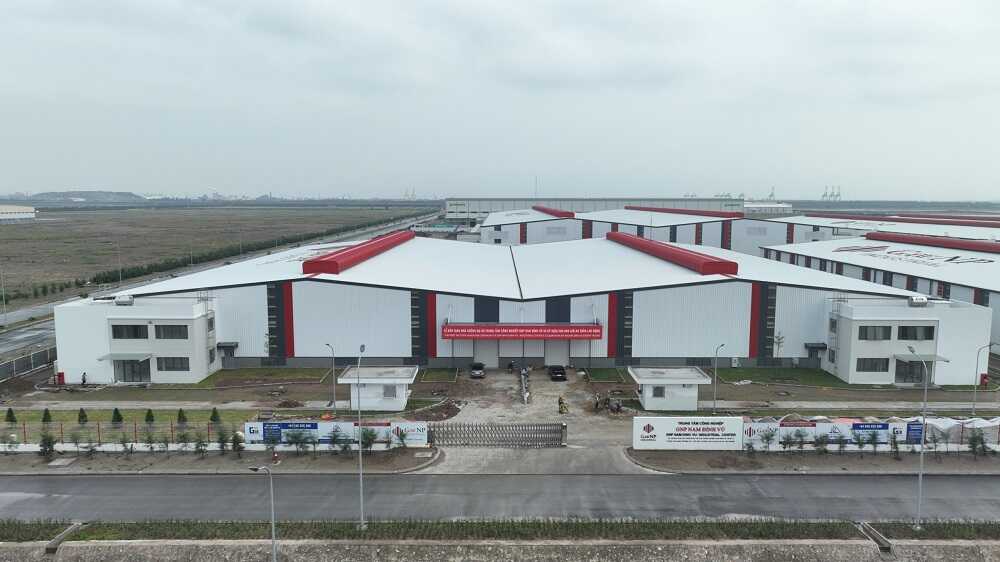
GNP Nam Dinh Vu Industrial Center
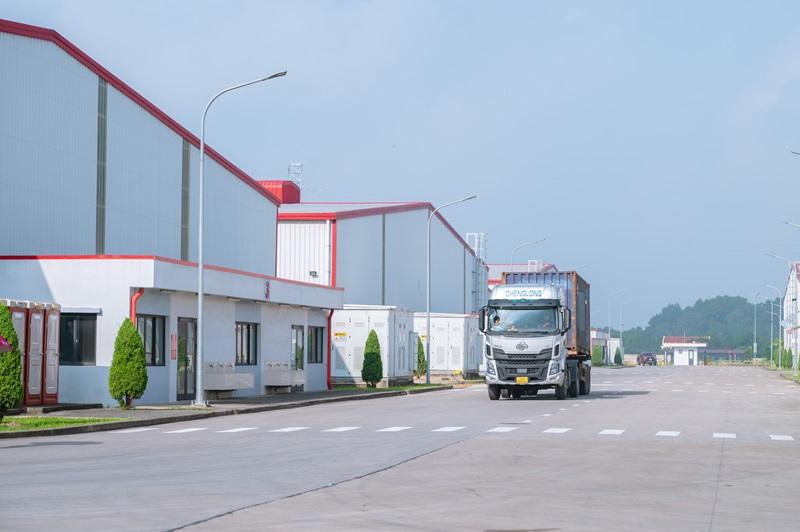
GNP Yen Binh 1 & 2 Industrial Center
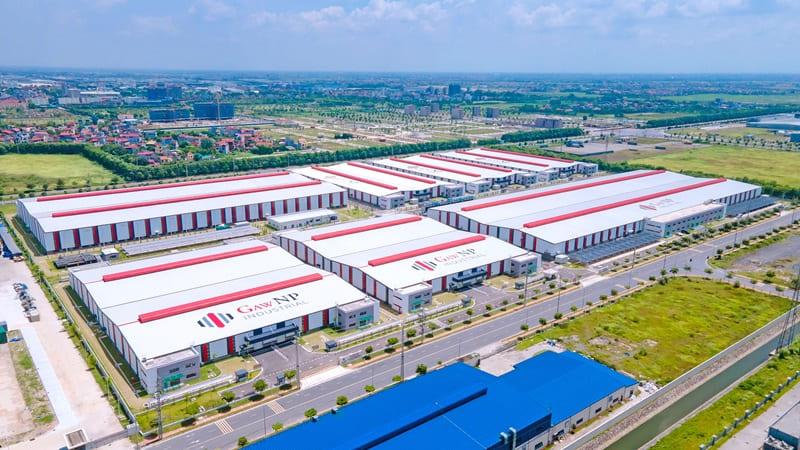
GNP Dong Van 3 Industrial Center
The factories for rent in Gaw NP Industrial’s projects are constructed with high quality. Additionally, these industrial centers are equipped with modern facilities and systems, such as three-phase power systems, clean water systems, fire-fighting systems, security camera systems, and fiber optic internet systems. Gaw NP Industrial centers also adhere to labor safety and environmental protection standards.
Gaw NP Industrial not only provides factories and warehouse for rent but also offers customer support services, including investment consultancy and legal procedure assistance. Gaw NP Industrial listens to and understands the needs of its customers, providing optimal solutions for each business. The company continuously strives to improve service quality to ensure customer satisfaction.
Gaw NP Industrial is a reputable and professional brand in the field of premium pre-engineered steel industrial factory rentals in Vietnam. With a customer-centric approach, Gaw NP Industrial aims to be a reliable and long-term partner for businesses both within and outside the country.
5. Conclusion
Industrial factories play a crucial role in the production and business activities of enterprises. Depending on the purpose, industry specifics, and business scale, one can choose a suitable factory construction. Each type of factory has its own advantages and disadvantages, along with different requirements for design, construction, and management. Therefore, businesses need to carefully consider before deciding on the factory that best fits their needs.
See more:
3 common types of pre-built factories and advice on leasing manufacturing spaces
Warehouse for lease in Vietnam | Warehouse for rent in Vietnam | Factory for lease in Vietnam | Factory for rent in Vietnam
